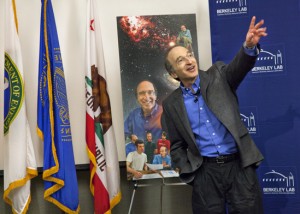Reported by Amy Standen and Gabriela Quirós, Quest

At this morning's press conference at Lawrence Berkeley National Laboratory, newly-minted Nobel laureate, astrophysicist Saul Perlmutter said what attracted him to his work initially was that it took a scientific approach to a philosophical question: What is the fate of the universe?
Since astronomer Edwin Hubble's observations in 1929, scientists have known that the universe appears to be expanding, pushing outwards and becoming thinner, like a stretched T-shirt.
Perlmutter, and others, assumed that the rate of this expansion must be slowing down, dragged down by the force of gravity.
"The obvious question," said Perlmutter, "was how much is it slowing down? Is it slowing enough that it could slow down to the point where it would come to a halt someday and perhaps turn around and collapse? In which case, we could discover that the universe was really coming to an end."